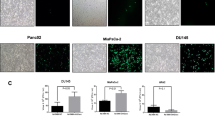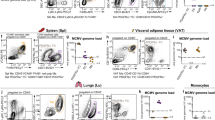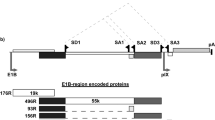Abstract
Simian virus 40 (SV40) replicates efficiently in monkey kidney cells. However, we have now found that SV40-based vectors transfected into most human cells replicate poorly, if at all. In contrast, strong SV40 replication is observed in human embryonic kidney (HEK) cells transformed with the adenovirus early region, but not in untransformed HEK cells. Vector replication in adenovirus-transformed cells is dependent on the presence of the SV40 origin of replication and large-T antigen. However, vigorous replication occurs at levels of large-T antigen that are undetectable by immunofluorescence. These data suggest that the adenovirus oncogenes create a replication-permissive environment to which the SV40 replicon responds. Furthermore, replication and gene expression seem to be antagonistic on our vectors. High levels of large-T antigen are observed only when vector replication is blocked by mutations in the gene for large-T antigen or the origin of replication, or by direct inhibition of DNA polymerase with aphidicolin.
This is a preview of subscription content, access via your institution
Access options
Subscribe to this journal
Receive 51 print issues and online access
$199.00 per year
only $3.90 per issue
Buy this article
- Purchase on Springer Link
- Instant access to full article PDF
Prices may be subject to local taxes which are calculated during checkout
Similar content being viewed by others
References
Calos, M. P., Lebkowski, J. S. & Botchan, M. R. Proc. natn. Acad. Sci. U.S.A. 80, 3015–3019 (1983).
Lebkowski, J. S., DuBridge, R. B., Antell, E. A., Greisen, K. S. & Calos, M. P. Molec. cell. Biol. 4, 1951–1960 (1984).
Tooze, J. DNA Tumor Viruses 2nd edn (Cold Spring Harbor Laboratory, New York, 1981).
Lusky, M. & Botchan, M. Nature 293, 79–81 (1981).
Wigler, M. et al. Cell 16, 777–785 (1979).
Hirt, B. J. molec. Biol. 26, 365–369 (1967).
Bachetti, S. & Graham, F. L. Proc. natn. Acad. Sci. U.S.A. 74, 1590–1594 (1977).
Major, E. O. & Matsumura, P. Molec. cell. Biol. 4, 379–382 (1984).
Imperiale, M. J., Feldman, L. T. & Nevins, J. R. Cell 35, 127–136 (1983).
Green, M. R., Treisman, R. & Maniatis, T. Cell 35, 137–148 (1983).
Treisman, R., Green, M. R. & Maniatis, T. Proc. natn. Acad. Sci. U.S.A. 80, 7428–7432 (1983).
Gaynor, R. B., Hillman, D. & Berk, A. J. Proc. natn. Acad. Sci. U.S.A. 81, 1193–1197 (1984).
Graham, F. L., Smiley, J., Russell, W. C. & Nairn, R. J. gen. Virol. 36, 59–72 (1977).
Gluzman, Y. Cell 23, 175–182 (1981).
Whittaker, J. L., Byrd, P. J., Grand, R. J. A. & Gallimore, P. H. Molec. cell. Biol. 4, 110–116 (1984).
Gluzman, Y., Frisque, J. & Sambrook, J. Cold Spring Harb. Symp. quant. Biol. 44, 293–300 (1979).
Huberman, J. A. Cell 23, 647–648 (1981).
Yates, J. L., Warren, N. & Sugden, B. Nature 313, 812–815 (1985).
Weeks, D. L. & Jones, N. C. Molec. cell. Biol. 3, 1222–1234 (1983).
Alwine, J. C. Molec. cell. Biol. 5, 1034–1042 (1985).
Lewis, E. D. & Manley, J. L. Nature 317, 172–175 (1985).
Tegtmeyer, P., Schwartz, M., Collins, J. K. & Rundell, K. J. Virol. 16, 168–178 (1975).
Reed, S. I., Stark, G. R. & Alwine, J. C. Proc. natn. Acad. Sci. U.S.A. 73, 3083–3087 (1976).
Tjian, R. Cell 13, 165–179 (1978).
Rio, D., Robbins, A., Myers, R. & Tjian, R. Proc. natn. Acad. Sci. U.S.A. 77, 5706–5710 (1980).
Lewton, B. A., DeLucia, A. L. & Tegtmeyer, P. J. Virol. 49, 9–13 (1984).
Harlow, E., Crawford, L. V., Pim, D. C. & Williamson, N. M. J. Virol. 39, 861–869 (1981).
Laemmli, U. K. Nature 227, 680–685 (1970).
Author information
Authors and Affiliations
Rights and permissions
About this article
Cite this article
Lebkowski, J., Clancy, S. & Calos, M. Simian virus 40 replication in adenovirus-transformed human cells antagonizes gene expression. Nature 317, 169–171 (1985). https://doi.org/10.1038/317169a0
Received:
Accepted:
Issue Date:
DOI: https://doi.org/10.1038/317169a0
This article is cited by
-
Development of a generic transient transfection process at 100 L scale
Cytotechnology (2008)
-
Factors affecting amplification of BK virus episomal vectors in human cells
Archives of Virology (1988)
-
Repression of simian virus 40 early transcription by viral DNA replication in human 293 cells
Nature (1985)
Comments
By submitting a comment you agree to abide by our Terms and Community Guidelines. If you find something abusive or that does not comply with our terms or guidelines please flag it as inappropriate.



